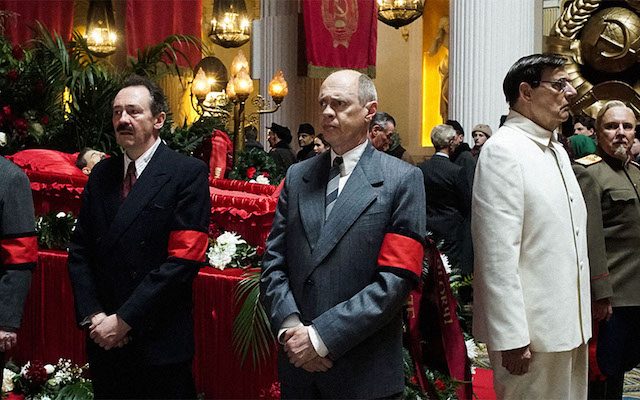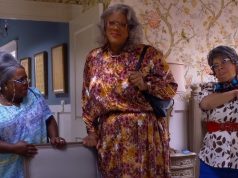
Armando Iannucci has written and directed two films in his career, and they’re both among the best political comedies ever made. First there was “In the Loop,” an extension of his British TV series “The Thick of It” (he also created HBO’s “Veep”) that used fictional U.K. and U.S. functionaries to satirize our two nations’ political dysfunction and eagerness for war. Now he returns (with co-writers David Schneider and Ian Martin) with “The Death of Stalin,” a breathtakingly dark comedy of errors that holds up the brutal Soviet dictator’s final days and their aftermath as a mirror to current British and American quagmires.
The fictionalized plot, which hardly exaggerates the truth, comes from a French graphic novel; Iannucci and company have added comedy to it, replaying horrific events as farce, turning everyone into greedy bumblers vying to be Stalin’s successor, finding grim laughs in the minutiae of his reign of terror. (“Don’t worry!” says the Radio Moscow director cheerily to the audience he’s hastily assembling at Stalin’s command. “Nobody’s going to get killed!”) When a not-yet-dead Stalin is lying unconscious on his office floor, everyone who enters the room inadvertently kneels in the same puddle of urine next to his body.
The masterstroke, however, is in the casting, and in the decision to have everyone speak in their native accents. So here’s Steve Buscemi as Nikita Khrushchev, a loud buffoon and sycophant who keeps track of which of his jokes get the best laughs; Jeffrey Tambor as Georgy Malenkov, Stalin’s gullible deputy (he weeps hilariously at the sight of Dear Leader incapacitated) whose idiocy makes him useful; Simon Russell Beale as Lavrenti Beria, a Cheney-like opportunist; Michael Palin as Vyacheslav Molotov, a befuddled bureaucrat who was on Stalin’s to-kill list; Jason Isaacs as Georgy Zhukov, swaggering military commander; Rupert Friend as Stalin’s raving conspiracy-theorist son. Stalin himself is played by Adrian McLoughlin in a rough working-class British accent, coming across like a street thug who rose to the top of a crime syndicate.
The few women who are present in all this — Stalin’s daughter (Andrea Riseborough), an anti-Stalin concert pianist (Olga Kurylenko), Khrushchev’s wife (Sylvestra Le Touzel), even down to Stalin’s secretary (June Watson) — happen to be the only reasonable, mature people in the story. This may have been a conscious choice by the filmmakers to comment on male paranoia and competition, or it may just be historically accurate.
True to form, Iannucci packs the dialogue with petty sniping and profane insults, cheerfully mining laughs from ghastly true events. It’s the sort of movie where you kill a political enemy, set him on fire, and then yell obscenities at the burning corpse. (Incidentally, it’s been ages since we saw Monty Python’s Michael Palin on the big screen, and Iannucci’s snarky-intellectual banter is a perfect fit for him.) But where Iannucci’s past work has had a fly-on-the-wall documentary feel, “The Death of Stalin” is more elegantly cinematic, accompanied by classical music (Chopin, Mozart, and of course Tchaikovsky) on the soundtrack. He performs a delicate tight-rope act, conjuring thoughts of Brexit and Trump without laying it on too thick, and mocking political connivers of all stripes with eloquent savagery.
A- (1 hr., 44 min.; )





